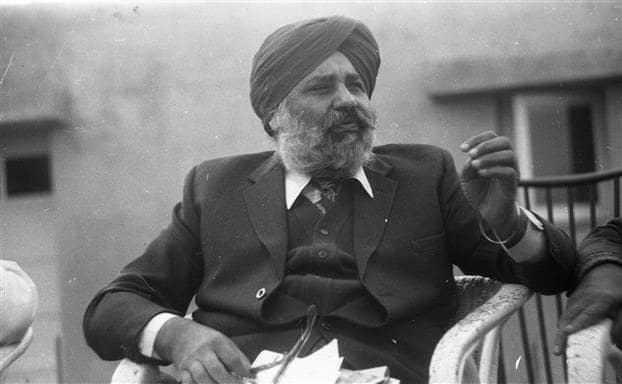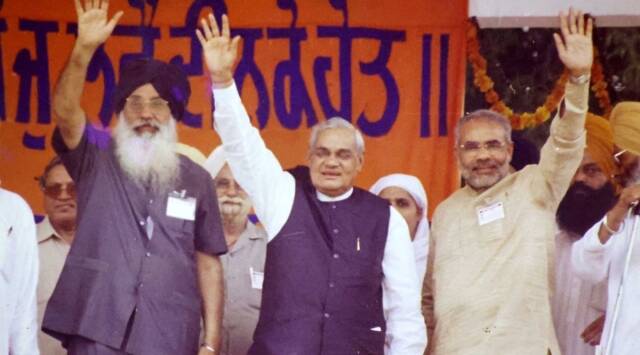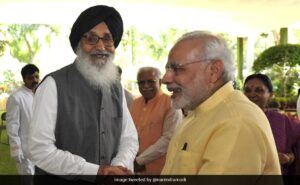Prakash Singh Badal, a renowned Indian politician, has been serving the people of Punjab for more than six decades. He is one of the most respected leaders in India, known for his vision and dedication towards the welfare of his people. Badal has played a significant role in shaping the political and social landscape of Punjab. In this article, we will delve into the life, achievements, and contributions of Prakash Singh Badal and why he is considered a visionary political leader.
Prakash Singh Badal was a prominent figure in Indian politics, Badal’s life and career have been the subject of much interest and scrutiny. In this comprehensive article, we will delve into Badal’s life, his political career, and his contributions to the state of Punjab.
Early Life and Political Career
Prakash Singh Badal was born on December 8, 1927, in the village of Abul Khurana in the district of Bathinda, Punjab. He completed his education at Forman Christian College, Lahore, and started his political career in 1947 by joining the Akali Dal, a Sikh political party in Punjab. He was first elected to the Punjab Legislative Assembly in 1957 and since then he has been a member of the assembly for eight terms.
Prakash Singh Badal became the Chief Minister of Punjab for the first time in 1970. He has served as the Chief Minister of Punjab for a record five terms. He was also a Member of Parliament in the Indian Parliament for four terms.

Visionary Leadership
Prakash Singh Badal is known for his visionary leadership and his efforts to transform Punjab into a prosperous state. During his tenure as Chief Minister of Punjab, he initiated several development projects, including the construction of roads, bridges, and canals. He also established several educational institutions and hospitals in the state to provide better education and healthcare facilities to the people.
Prakash Singh Badal played a key role in the Green Revolution of the 1960s and 1970s, which transformed the agricultural sector in India. He implemented several policies and programs to improve the agricultural sector and make Punjab self-sufficient in food production. His efforts led to a significant increase in agricultural productivity and helped Punjab become one of the most prosperous states in India.

Dedication to Public Service
Prakash Singh Badal has always been dedicated to public service and has worked tirelessly to improve the lives of people in Punjab. He has implemented several welfare schemes and programs for the benefit of farmers, youth, women, and other marginalized sections of society. He has also worked to promote religious harmony and unity among different communities in Punjab.
Prakash Singh Badal is widely respected for his integrity, honesty, and commitment to public service. He has always been a strong advocate of the rights of the people and has fought for the interests of the state of Punjab in the Indian Parliament.
Badal’s Legacy as Chief Minister
Prakash Singh Badal is widely regarded as a transformational leader who spearheaded the development and modernization of Punjab during his tenure as Chief Minister. His government introduced several policies and schemes aimed at boosting agriculture, industry, and infrastructure in the state.
One of the most significant achievements of Badal’s government was the establishment of the Punjab Agricultural University, which has played a crucial role in advancing agricultural research and education in the region. The government also launched the Green Revolution in Punjab, which transformed the state’s agricultural sector and led to a significant increase in crop yields.
Badal’s government also focused on improving healthcare and education in the state. The government established several medical colleges and hospitals, as well as engineering and technical institutions, to promote skill development and employment in the state.
Under Badal’s leadership, Punjab also made significant progress in infrastructure development. The government undertook several projects to improve road connectivity, water supply, and power infrastructure in the state.
Badal’s Contributions to Indian Politics
Prakash Singh Badal’s contributions to Indian politics have been significant and far-reaching. He has played an instrumental role in the formation and growth of the Shiromani Akali Dal, which is one of the oldest and most prominent political parties in Punjab.
Badal’s tenure as Chief LegacyMinister of Punjab was marked by a focus on development and progress, which helped transform the state into a leading center of agriculture, industry, and education in India. His government’s policies and initiatives laid the foundation for the state’s rapid economic growth and development in the years to come.
Prakash Singh Badal is known for his contributions to the development of Punjab’s agricultural sector and his advocacy for the rights of the Sikh community.
Prakash Singh Badal is associated with the Shiromani Akali Dal, a political party that represents the interests of the Sikh community in India.
Prakash Singh Badal served as Chief Minister of Punjab for five terms, from 1970-71, 1977-1980, 1997-2002, 2007-2012, and 2012-2017.
Prakash Singh Badal played a key role in the Punjab Accord of 1985, which ended the Sikh separatist movement in the state.
Prakash Singh Badal is known for his contributions to Indian politics and his tenure as the Chief Minister of Punjab.
Badal’s tenure as Chief Minister was marked by a focus on development and progress, and his government introduced several policies
Conclusion
Prakash Singh Badal is a visionary leader and a true statesman who has dedicated his entire life to public service. He has played a key role in the development of Punjab and has worked tirelessly to improve the lives of people in the state. His legacy of visionary leadership, dedication to public service, and commitment to the welfare of the people will always be remembered. His legacy as a transformational leader who focused on development and progress continues to inspire future generations of politicians and leaders in the state and across the country.

Your point of view caught my eye and was very interesting. Thanks. I have a question for you.
Your point of view caught my eye and was very interesting. Thanks. I have a question for you.
I’m really glad to hear that my article helped you feel hopeful!